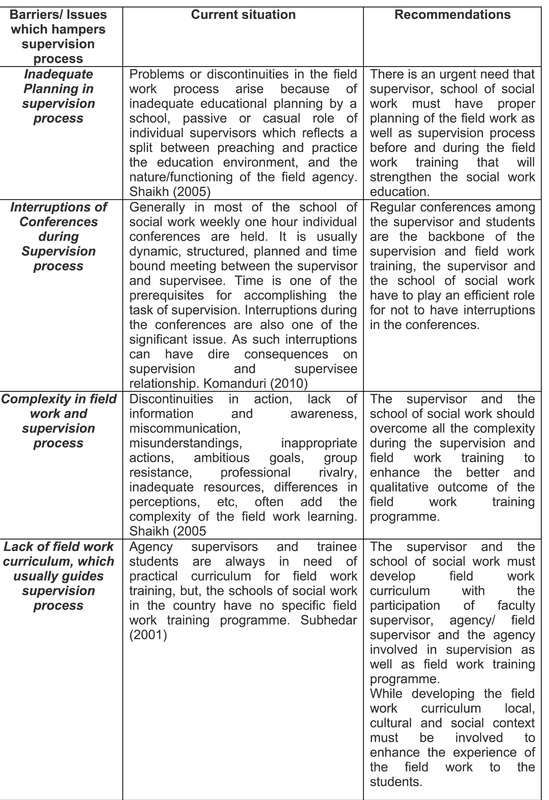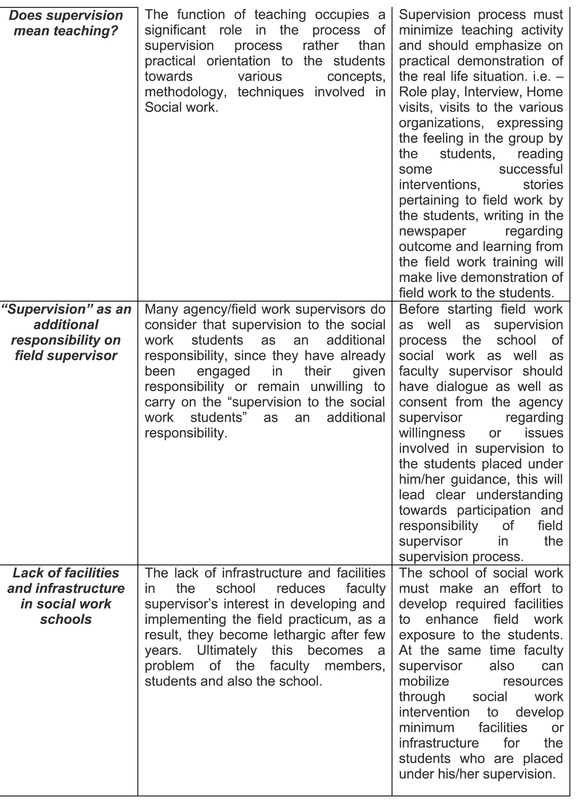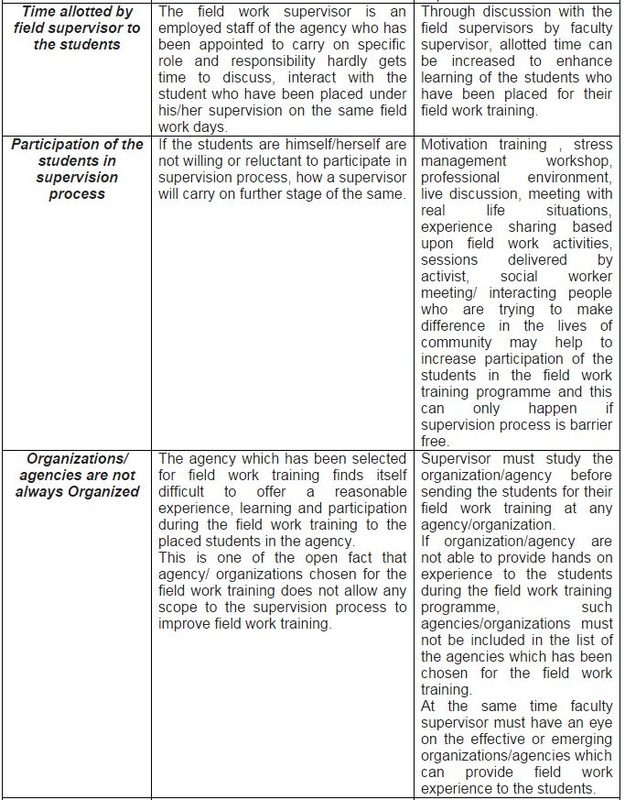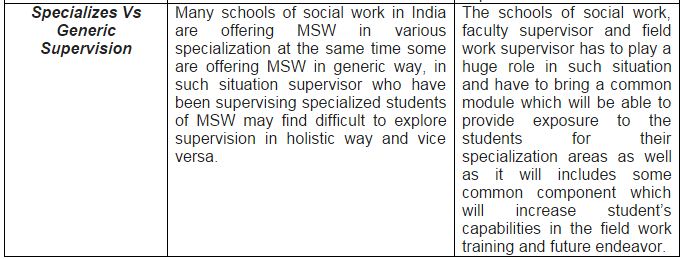|
(The article is based upon secondary review and experience accumulated while working as faculty supervisor for MSW field work training programme at Dept. of Social work, Walchand College of Arts and Science, Solapur, Maharashtra. The paper attempts to explore issues/barriers in the supervision process which impacts on the empowerment of field work training in social work education at the same time it also has suggested some recommendation to overcome the issues/barriers involved in supervision process. ) Key Words: Supervision, Field Work Training, Empowerment, Social work Education, “Field work supervision teaches the students to integrate theory and practice in the field. It creates an environment in which professional skills for social work practice can be learnt” Dr. I. S. Subhedar Introduction: Supervision in field work training is one of the core elements in development and maintenance of high standards of social work practice. It is essential to improve the quality of human service delivery and professional development of frontline Social work practitioners. The primary objectives of professional supervision in social work are to enhance, ensure and enable humanistic, competent and independent social work practice. Ultimately, supervision benefits the service users. The supervisory process in both the traditional and developmental approaches to social work will be similar except that of change in the latter’s which is holistic, and the stress on participant role by the supervisor. However, even a developmentally oriented supervisor may have to identify traditional task for a particular student and help him in this field learning if he finds that capacity of students to appreciate the new perspective is limited. This only shows how the two approaches are interrelated phases, and they are not dichotomous in practice as they appear to same in theory. Shaikh (2005) Relevance with Theory and Practice: Field -Work is the only way Field work training could be well considered learning through doing. Field work seen as integrating factor which acts as a balancing force between theory and practice. Field work is concerned to be an integral part of social work education by all the schools of social work in India. It is the field training that distinguishes social work education from other social sciences (Lawani 2009). Field work training helps the social workers to bring theory of the profession into practice. As we know that the principles and methods of social work cannot be taught in a vacuum, its study cannot be confined to only a set of people like intellectual and the theoretical knowledge developed in the classroom has to be necessarily augmented by a practical programme of field work (Lawani 2009). Field work, therefore, is a way to translate knowledge through certain skills and techniques into action. The importance of field work training in professional social work education is consequential because of its nature of dealing with problems practically. The second Review Committee on Social work education 1978 has mentioned the following objectives of field work in Social work education:
Supervision as an Educational Value: New face of Supervision Komanduri (2010) has stated that “Educational supervision is one of the primary responsibility of social work educator. Through the individual and group conferences the social work trainee is enabled to learn effective social work techniques. In this process social work educator as a supervisor plays the role of facilitator, teacher, guide, helper and adviser, suggest and helps the supervisee to develop the necessary knowledge, skills and attitude necessary for performing the necessary social work task. Kapustin (1976) further states that educational component of supervision is concerned with teaching the workers what he needs to know in order to do his job and helping them to learn it. Every job description of the supervisor’s positions includes listing of his function, instruct workers in acceptable social work techniques, develop competence through individual and group conferences, train and instruct in job performance. “Educational supervision is central to the successful of a social work student’s field work education experience. As such field work instructors or supervisors should require training regarding effective supervision and also training in continuing education theoretically should and imperially based practices (Komanduri 2010) Unsolved issues/barriers in Supervision: Supervision has been seen as central element in field work training; strengthening as well as barrier free supervision is key to success to empower over all outcome of the field work training in social work education. Since inception of social work education in India, we all are unable to resolve so many issues/barriers in supervision process which affect the supervision process. Quoting some of them which need to resolve as possible as early.
There are many issues/barriers in supervision process have been identified which require urgent discussion as well as mechanism to solve it. Strengthening supervision process may lead towards overall empowerment of field work training in social work education in India. Following table has made an attempt to put forward issues/barriers in supervision process which impacts on overall empowerment of field work training in social work education. Barriers / Issues which hampers overall empowerment of Supervision in field work training of Social work education: Conclusion: Supervision in field work training has been considered as an integral part of social work education in India. It is the barrier free supervision that will distinguish, enhance and increase the scope of field work training as well as social work education. The barrier free supervision is not only going to help to the field work but it will also impact on the efficacy, outcome and credibility of the social work profession, therefore the responsibility of making supervision barrier free in field work training lies with faculty supervisor, field supervisor and the school of social work. References:
*Mr. Jitendra S. Gandhi
*Mr.Mahesh P. Chougule *Mr.Abhay M. Jadhav *Assistant Professor, Dept. of Social work, Walchand College of Arts and Science, Solapur, Maharashtra. |
Categories
All
Social Work Learning Academy50,000 HR PROFESSIONALS ARE CONNECTED THROUGH OUR NIRATHANKA HR GROUPS.
YOU CAN ALSO JOIN AND PARTICIPATE IN OUR GROUP DISCUSSIONS. MHR LEARNING ACADEMYGet it on Google Play store
|
SITE MAP
SiteTRAININGJOB |
HR SERVICESOTHER SERVICESnIRATHANKA CITIZENS CONNECT |
NIRATHANKAPOSHOUR OTHER WEBSITESSubscribe |
MHR LEARNING ACADEMY
50,000 HR AND SOCIAL WORK PROFESSIONALS ARE CONNECTED THROUGH OUR NIRATHANKA HR GROUPS.
YOU CAN ALSO JOIN AND PARTICIPATE IN OUR GROUP DISCUSSIONS.
YOU CAN ALSO JOIN AND PARTICIPATE IN OUR GROUP DISCUSSIONS.
|
|










 RSS Feed
RSS Feed





